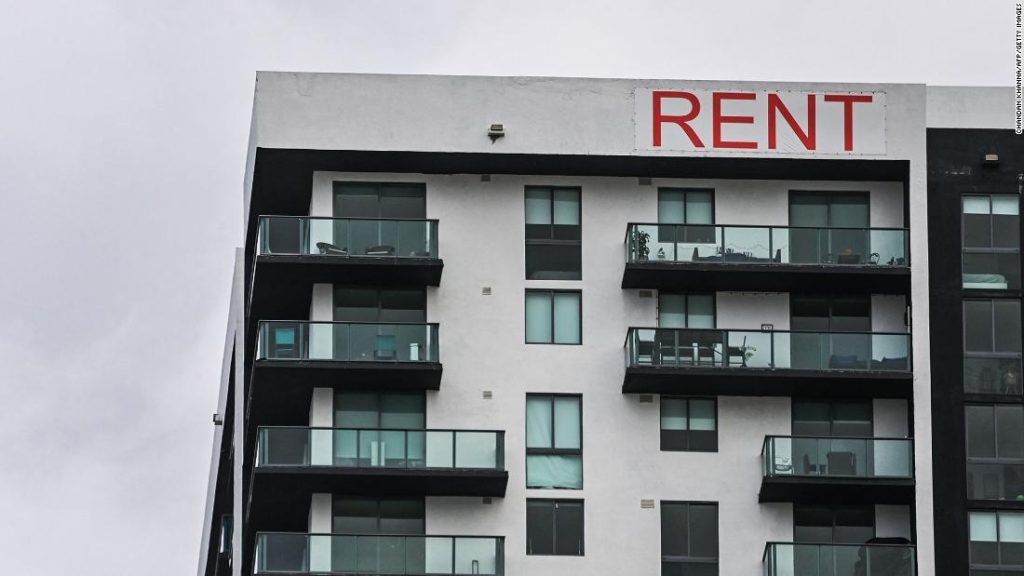
The national average rental price jumped 19.8% in January from a year ago, marking the eighth consecutive month of double-digit increases, according to a report from Realtor.com. The national median rent was $1,789 last month.
“The rental markets in the US are more than making up for lost time,” said Danielle Hill, chief economist at Realtor.com. Rents are now up 21% since January 2020, before the pandemic.
The biggest jump in rents in January was in the Miami, Fort Lauderdale and West Palm Beach Florida areas where average rent was $2,895 a month in January, up 52.4% from a year ago. Miami is now the fifth most expensive place to rent in the country after several cities in California: San Jose, San Diego, Los Angeles, and San Francisco.
The report found that the monthly cost of buying an entry-level home was more affordable than renting a unit of the same size in more than half of the 50 largest US cities.
While many people looking for an affordable place to live feel stuck between a rock and a hard place as rent and home purchase costs are rising, a number of factors could tip the affordability scale in favor of first-time home buyers this year. Hill said.
Rentals are expected to outpace list-for-sale price growth in 2022 and are already accelerating across all rental sizes. Additionally, she said, survey data shows that the majority of landlords plan to increase their asking rents this year.
Where is it better to buy?
Looking at national average home prices and rents, the monthly cost of rents is still slightly cheaper than owning an entry-level home, the report found.
But in 26 of the 50 largest cities, the average monthly cost of buying a junior home was 20.6% — or $323 — less than renting a home in January, according to Realtor.com.
The purchase was most beneficial in Birmingham, Alabama, where the cost of purchasing an initial home was 44.3% lower than the cost of renting in January. Cleveland, Pittsburgh, and St. Louis followed suit.
Two Florida cities – Tampa and Orlando – saw the fastest annual rental growth in January. In Orlando, purchase was 27.1% less than rent and in Tampa, purchase was 25.5% less.
Just because it’s better to buy in a city doesn’t mean home prices don’t make solid gains either – often they are both. In eight of the 10 best buy markets, the monthly cost of buying an initial home and renting one has increased over the past year, according to the report.
The decision to rent or buy ultimately depends on personal circumstances, including location, financial situation, and how long the buyer intends to live in the home.
In general, it’s not financially desirable to buy if you plan on living in your home for less than a few years, and the general rule is to never spend more than 30% of your income on housing costs, Hill said.
In addition, buying a home is a lot easier said than done in many markets, with the stock of homes for purchase at a record low.
Where is the best rent?
Given the massive increase in housing prices in some major cities, there are many places where rent is still more affordable than plunging into the competitive high-priced housing market, according to the report.
In January, the monthly cost of buying was about 25% — or $536 more — than the cost of renting in 24 of the 50 largest metro areas on average.
Austin, Texas was the city that would have been better to rent rather than buy in January. According to the analysis, monthly payments were about 76% higher — or $1,346 more — to buy an initial home in Austin than to rent. New York followed. San Francisco; San Jose; Seattle. Boston. Denver. Rochester, New York; Portland, Oregon; and Los Angeles.
In these top 10 rent-preferred cities, monthly payments for an initial home purchase were 41.6% — or $978 higher than rents — on average. Starter homes for sale in those locations included a higher average share of apartments than the national average, and higher-priced Homeowners Association fees.
“Determining when to go from renting to first-time buying is very much dependent on the life stage,” Hill said. “For young Americans like Gen Z who may have moved home to save money during Covid, renting in a high-tech city offers flexibility and relative affordability even as rents in these areas rebound.”

“Web maven. Infuriatingly humble beer geek. Bacon fanatic. Typical creator. Music expert.”





More Stories
Dow Jones Futures: Microsoft, MetaEngs Outperform; Robinhood Dives, Cryptocurrency Plays Slip
Strategist explains why investors should buy Mag 7 ‘now’
Everyone gave Reddit an upvote